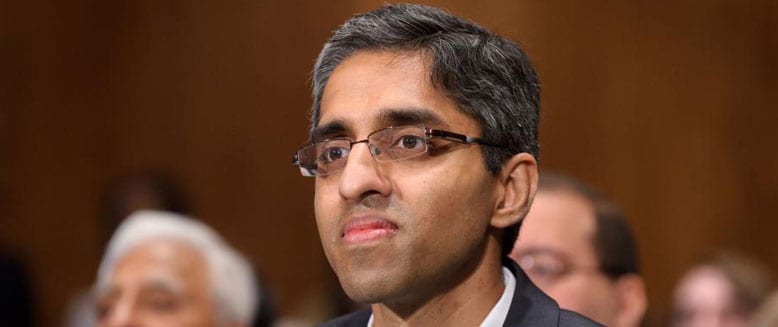Surgeon General Dr. Vivek Murthy’s new report proposes several improvements to how we perceive and treat addiction
A reported issued last November by Surgeon General Dr. Vivek Murthy, calls for a major shift in how the United States addresses addiction. In his report, he outlines several effective methods that follow the disease model of addiction, focusing on improving treatment options and steering away from our old heavy-handed drug policies.
“Facing Addiction in America: The Surgeon General’s Report on Alcohol, Drugs and Health” marks the first time a U.S. Surgeon General issued a report dedicated to addiction, advocating evidence-based treatment options and raising awareness of the need for reform. Murthy leverages several stark statistics, to paint a bigger picture:
- More people use prescription painkillers than those who smoke cigarettes.
- More people suffer from addiction than people with cancer.
- Addiction costs the U.S. over $420 billion a year.
- Overdoses from prescription painkillers have quadrupled since 1999.
Shifting Our Views on Addiction
“Our whole approach to substance abuse disorders is they’re illegal and you go to jail,” Murthy states. “It’s the only illness for which you send people to jail, for long periods of time.” The U.S. now holds the world’s largest prison population, which accounts for nearly 25 percent of the world’s prisoners, most of whom meet the criteria for a substance abuse disorder.
Murthy says, “For far too long people have thought about addiction as a character flaw or a moral failing”. He added “Addiction is a chronic disease of the brain and it’s one that we have to treat the way we would any other chronic illness: with skill, with compassion and with urgency.”
Improving Treatment Options
The overruling theme of Murthy’s report is that addiction is a medical problem and must be treated as such. He proposes a comprehensive approach is required to effectively treat addiction in the U.S., which includes:
- Increasing public awareness of the dangers of drug use and the demand for effective methods for treat them.
- Widely implementing “evidence-based prevention policies and programs” to prevent drug abuse and related problems.
- Improve access to evidence-based treatments for addiction, integrating them into mainstream options.
- Support services for helping people to remain sober and prevent relapse.
- Implementing public policy measures and financing strategies based on research to make sure that treatment services are “accessible, compassionate, efficient, and sustainable”.
Letters were sent to over 2.3 million clinicians, asking for their support to solve our country’s opioid epidemic and pledge to test their patients for drug abuse, put them in touch with treatment providers and discuss that addiction is a chronic disease.
Murthy states “We need to take the next step and ensure that these kinds of services are available to everyone. That’s where, right now, we have some real challenges as a country”. He adds “We know that despite the evidence that treatment works, not everyone can get access to it.”
Murthy stresses the use of “Recovery-oriented Systems of Care”, such as long-term care, outpatient treatment, recovery coaching and sober living. These services promote a “vision of care that is directed by people in recovery, emphasizes the reality and hope of long-term recovery”.
Promoting Harm Reduction
Murthy embraces the use of harm reduction approaches, such as expanding the availability of needle exchanges, overdose prevention education and access to Narcan, the overdose reversal drug.
Some critics say that promoting harm reduction will encourage drug abuse but evidence from the report has shown otherwise. These services help to connect struggling addicts to proper healthcare so when they are ready to quit, they get the help they need to do so.
Murthy noted an incident last year, where a small town in Indiana saw one of the country’s largest HIV outbreaks since the 1980s and instituted a needle exchange program to curb the problem.
Other countries have used safe injection sites, which have shown favorable results as well.
Moving Forward
The Surgeon General’s report urges lawmakers to expand and employ evidence-based addiction treatment options, which recent statistics show is definitely needed.
He urges us all to change the way we perceive and treat addiction because too many Americans suffer in silence from this disease. Over 21 million Americans suffer from addiction and only 10 percent of them receive treatment.
It’s not just the drugs that are the problem; it’s how we treat addiction. Through improving access and expanding treatment services, millions of people can finally come out of the dark and get the help they deserve. The stigma of addiction has fueled our country’s failed drug policy and law makers are recognizing the critical need for reform.
About Northbound
Northbound is a Joint Commission-Accredited dual diagnosis treatment provider, specialized in treating adults with addiction and co-occurring disorders. We incorporate 12 step support, evidence-based therapies and transitional care options that align with the surgeon general’s proposal, helping our clients through each step of the way in their early recovery.










